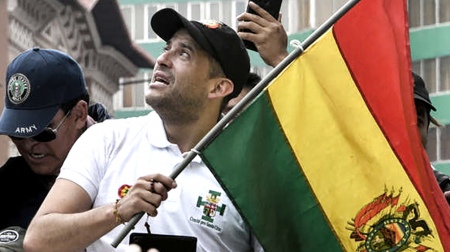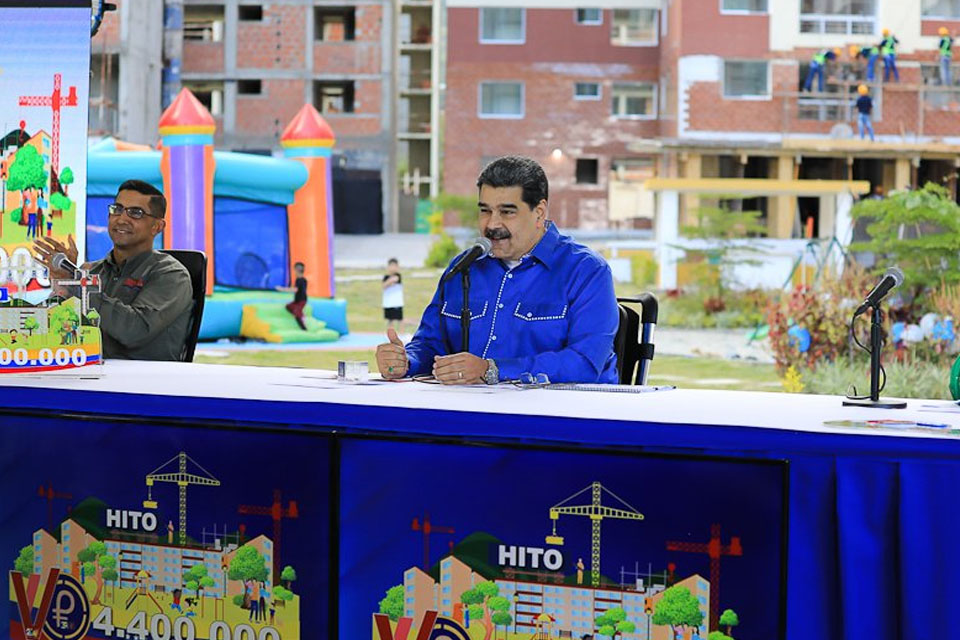The fate of the detained governor of the Bolivian department of Santa Cruz and opposition leader, Fernando Camacho, at least for the next few months, was at stake tonight in an open-ended judicial hearing, in which the Prosecutor’s Office had requested six months of preventive detention to the leader, while the Santa Cruz Civic Committee called for a general strike for Friday and to block routes in defense of the president.
The Bolivian Prosecutor’s Office defended at the hearing the request for six months of preventive detention for Camacho, arrested on Wednesday for his role in the 2019 coup against former president Evo Morales, and the governor’s defense presented two requests for freedom, one in Santa Cruz and another in La Paz.
The document with the formal accusation presented by the prosecutor Omar Mejillones before the Eighth Criminal Court of Instruction, published by the Bolivian press, warns of a flight risk or the possible obstruction of the investigations by the opposition leader.
Camacho “does not have a habitual residence”, presents a “considerable migratory flow”, with departures to Brazil, Peru, Panama, the United States, Argentina and Spain, and his eventual release constitutes “an ease to leave the country”, says the indictment .
Camacho’s defense dismissed the request as “insane” and ironized about the “record time” in which the entire procedure was carried out.
“Record time everything that the Public Ministry has operated since Wednesday to deprive the governor of his freedom, to bring him violently to the city of La Paz. (…) There are many aspects that call our attention, that worry us because obviously we are not living in a rule of law,” said defense attorney Carlos Ledezma.

Camacho was arrested on Wednesday in Santa Cruz in the framework of the “coup d’état I” case, which is investigating him for his role in the 2019 coup against then-President Morales.
This Thursday, the opposition leader invoked his right to silence before the Prosecutor’s Office and preferred to wait for the virtual hearing in which his situation was analyzed, to see if he would defend himself in freedom or from jail.
“Since I do not believe in the Bolivian Justice and in order that the statement is not distorted to seek to incriminate someone else, I prefer to defend myself in writing,” Camacho said, quoted in a statement from the Santa Cruz Governor’s Office.
As explained by the Public Ministry hours after the arrest, Camacho was apprehended in the framework of a “due process” based on the complaint of the former deputy of the ruling Movement for Socialism (MAS) Lidia Patty for the alleged crimes of terrorism, sedition and conspiracy. .
The prosecuting lawyer, Jorge Nina, announced that he will also request Camacho’s preventive detention and recalled that the arrest warrant executed last night is not recent and the defense was aware of it, the Bolivian news agency ABI said.
After his arrest, Camacho first went through the El Alto Special Force to Fight Crime (FELCC) and was then taken to the police offices in the city of La Paz.
At the gates of that police headquarters this Thursday there were some clashes between those who brought their solidarity to Camacho and those who celebrated his arrest.
During the early hours of the morning, on his Twitter profile, the opposition leader wrote the message: “Today I was kidnapped by the MAS justice. My only fault is having defended democracy and together with a whole united people, having stopped fraud.”
Prosecutor Mejillones, before the press, clarified that Camacho does not have immunity due to his role as governor and that at first it was considered taking a statement from him in the city of Santa Cruz, but that idea was abandoned.
“He doesn’t have any kind of immunity; They are crimes that are being prosecuted in an ordinary order and the Public Ministry has been carrying out the investigative actions for two years and the procedure is being followed ”, he stated.

On the reasons for his transfer, instead of taking his statement in the capital of Santa Cruz, he replied: “With everything that has happened in the city of Santa Cruz, imagine if we had taken, as initially planned, the statement in the city… ”.
Although some protests continue in the capital of Santa Cruz, the state-owned Navegación Aérea y Aeropuertos Bolivianos (Naabol) reported in a statement that all administrative and operational activities were resumed at the Viru Viru airport, which was occupied by protesters on Wednesday.
In a decision that threatens to aggravate the already worn-out relations between the central government and that of Santa Cruz, the regional Civic Committee – promoter of the 36-day strike demanding that the national census be carried out in 2023 – decided on Friday a strike of activities demanding the release of Camacho.
“A 24-hour civic strike has been declared since December 30, demanding the immediate release of the governor of our department,” said the head of the Committee, Rómulo Calvo, when reading the document with the conclusions of the so-called “cruceñidad assembly.”
The Committee also ordered the blockade of national and international routes and called for “permanent vigilance in public institutions to prevent self-attacks from continuing.”
The last measure appears to be a reference to the attacks suffered by the headquarters of the Santa Cruz Departmental Prosecutor’s Office and the offices of National Taxes and the Directorate of Support for the Prevention of Drug Consumption, Control of Illicit Traffic of Controlled Substances and Excess Coca (Diprevcom).
The house of the Minister of Public Works of the Nation, Edgar Montaño, who this Thursday held Camacho responsible was also set on fire and looted; the head of the Civic Committee, Rómulo Calvo; and the rector and vice-rector of the Gabriel René Moreno Autonomous University (UAGRM), Vicente Cuéllar and Reinerio Vargas, respectively, for that attack.
















